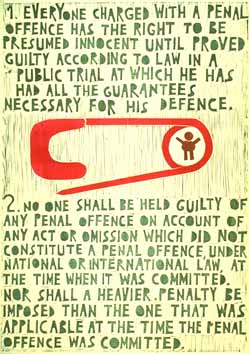Abandoning rule of law does not make us safer

Australian Lawyers for Human Rights (ALHR) fears the Australian Government is abandoning vital principles that form the bedrock of our criminal justice system in knee-jerk anti-terror proposals regarding bail and parole.
ALHR Vice President Kerry Weste said, “We are concerned that the Prime Minister’s hasty proposal to create presumptions against bail and parole for people alleged to have demonstrated support of, or links to, terrorist activity, fails to consider the implications of such a move for fundamental human rights and rule of law principles such as the presumption of innocence.”
“We are urging the Federal and State governments to release the detail of any such proposals as soon as possible and to allow a sufficient period of consultation before any bills are introduced.”
“The danger in overly hasty, populist and crude responses to the terrorism threat is a loss of fundamental rights for all Australians. Any such loss changes our society and the nature of our democracy and in fact represents a victory for terrorism – when we abandon key principles such as “innocence until guilt is proven” and the rehabilitative purpose of criminal justice, then terrorists will have actually succeeded in damaging our way of life and transforming our society.”
“Requiring courts to enforce a presumption against bail or parole undermines the very important principles of judicial discretion and the presumption of innocence. It is therefore inconsistent with Australia’s obligations under international human rights law.”
“It is important to remember that presumptions against bail deprive a person of liberty before any finding of guilt has been made. Moreover, legislating the mandatory refusal of parole all too often ignores the potential for serious miscarriages of justice to result.”
“Parole is an essential part of Australia’s criminal justice system and plays a very significant role in protecting the community by maintaining supervision and support for a period after a person is returned to the community. Parole decision-making should comply with fundamental human rights principles and natural justice. It must be both fair and accountable, providing for appeal and review.”
“What is more worrying is that the context of the Prime Minister and Commonwealth Attorney General’s comments this week appears to suggest it may be appropriate to arbitrarily detain a person in connection with a crime for which they have been acquitted.”
“They also appear to suggest that a person could be deprived of their liberty and punished prospectively based on an assumption that they might commit a crime at some point in the future: in other words they are being punished for a supposed ‘thought’ crime that lacks any deliberate, physical action by the accused.”
“While we are yet to see the detail of these proposals we would hope that the Prime Minister and the Attorney General as the nation’s first law officer understand that moving perilously close to a system which allows arbitrary detention at the discretion of the executive arm of government does not make Australia a safer place. In fact it makes us less safe by threatening the principles that form the fundamental structure of our criminal justice system.”
“We must think about the kind of society we want. Although recent abhorrent incidents of violent terrorism instil fear in us all and devastate the families directly involved, the reality is that in Australia we are far more likely to be victims of domestic violence or drunk drivers. An evidence-based approach would focus on the rehabilitative role and purpose of criminal justice, especially in terms of increased resources for programs aimed at de-radicalisation and the prevention of radicalisation in the first place.”
Media Contact: Matt Mitchell
M: 0431 980 365 E: media@alhr.org.au
ALHR was established in 1993 and is a national network of over 2600 Australian solicitors, barristers, academics, judicial officers and law students who practise and promote international human rights law in Australia. ALHR has active and engaged National, State and Territory committees and a secretariat at La Trobe University Law School in Melbourne. Through advocacy, media engagement, education, networking, research and training, ALHR promotes, practices and protects universally accepted standards of human rights throughout Australia and overseas.



